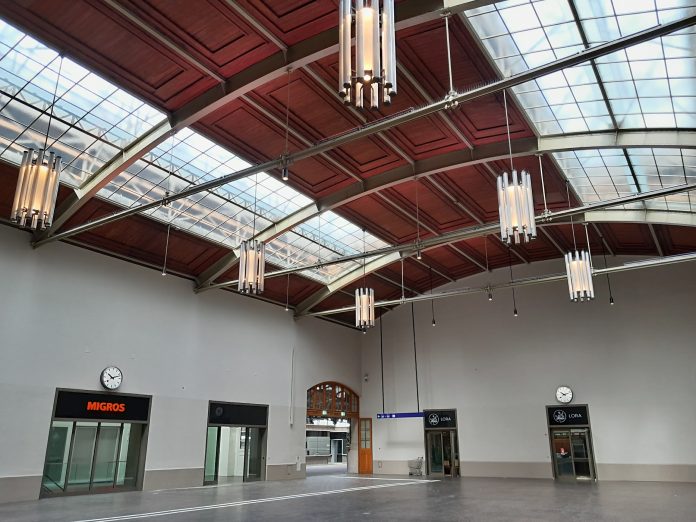Basel Train Station (Basel SBB) in Basel, Switzerland, is a primary hub for travel throughout Europe.
Regarded as Europe’s busiest international train station located at the intersection of France, Germany, and Switzerland, 1,000 trains depart from the station daily, equating to a passenger train departing or arriving at the station every 90 seconds.
Additionally, freight trains still use some of the 17 tracks, and postal trains enter and exit the underground station daily.
Travellers are inundated with a wide range of sights and sounds as they pass through Basel SBB.
At any given moment, the station announces arrivals, boarding and departure times, safety and security information, and marketing and services messaging while competing with the ambient train noise, and the droning murmur of fellow travellers moving from point A to point B.
With high ambient and train noise compounded by several high, reflective ceilings and walls, announcements were often hard to understand, which had the potential to create traveller confusion, missed trains, and unnecessary congestion throughout the station.
Basel SBB needed to cut through the noise, capture attention and deliver intelligible, actionable and sometimes critical safety information to a quickly-moving public.
However, the previous communications system and installed loudspeakers were not up to the acoustic challenges of the space.
With a major renovation planned for the station’s west hall, which houses two large waiting areas, a cafe, and a few small convenience and service stands, management recognised an opportunity to upgrade the audio and mass communications system simultaneously and sought the help of Chris Steiger, CEO of Zurich-based pro audio distribution firm promedias AG.
“Station managers needed to drastically improve the coverage and intelligibility for announcements within the train station,” said Steiger.
“The hall is so busy, noisy, and acoustically alive that it was difficult for passengers to hear and understand announcements. Further, managers were worried that the audio would be inadequate when critical safety or evacuation announcements needed to be made.”
Steiger and his team partnered with AV integrator avidec AG to design and install the mass communications system for the hall due to avidec’s specialisation and certification in voice alarm systems and emergency warning systems.
avidec deployed AtlasIED’s EN54-approved 5400 system in the west hall to modernise the system, given the platform’s advanced capabilities and storied success at other major transportation hubs worldwide.
AtlasIED designed and engineered the 5400 Series to meet the rigorous demands for mass notification and emergency communications initiated by the EN54-16 standards for European life safety signalling and paging systems.
The 5400 Series provides voice evacuation and emergency response features, but also solutions for day-to-day communications and paging needs.
The station installed multiple products within the 5400 series, including the IED5400ACS Announcement Control System (ACS).
Serving as the heart of the train station’s system, the 5400ACS is a software-based network appliance that controls the flow of communication traffic, and dynamically sends and receives media from each endpoint while bridging between multiple network protocols simultaneously.
The ACS contains all of the intelligence to manage an entire system of various AtlasIED emergency communication stations, digital zone manager amplifier units, and other network peripherals installed throughout the west hall.
The ACS connects to several 5404DZM Digital Zone Managers (DZM), each providing the digital signal processing and management of four paging zones. Station management wanted to include six volume levels on each train platform for greater control for various zones.
The 5404DZM provides backup amplifier switching by switching up to four speaker loads from a primary power amplifier to a backup when a failure is detected. It also contains integrated supervision that monitors each signal path and reports any failures to the 5400ACS, all of which provides critical redundancy.
The AV project team then installed multiple 5450CS Communication Stations located strategically throughout the hall to initiate announcements in the system.
The 5450CS, which can connect to a station’s Ethernet network, is a fully programmable touchscreen device that includes a gooseneck microphone and handheld microphone for station personnel to make announcements.
Additionally, the station added the AtlasIED IPUSBD-16 Dante network audio device, which provides the ability to connect to an existing Dante network and products, such as loudspeakers and microphones.
The station’s renovation helped return the west hall to its original historic condition, restoring paintings that showcased aspects of Swiss history and contributing to the preservation of Switzerland’s cultural heritage.
In addition to re-establishing the historic ambience, the retrofit added more natural light and better signage for traffic routing. The new AtlasIED system communications system and loudspeakers installed provided greater acoustical coverage and audibility, which helped create a better overall customer experience for station passengers.
“The cooperation with the avidec project team was exemplary. Problems and ambiguities were communicated continuously so that we could react quickly and find suitable solutions,” said Daniel Kurth, technical projects manager at Basel SBB. “We are very satisfied with the mass communication system from AtlasIED.”
Basel train station along with Steiger is now exploring plans to expand audio into several additional areas of the station. The managing authorities are also considering using AtlasIED at two other stations once the station completes a final analysis of the existing system at Basel.





